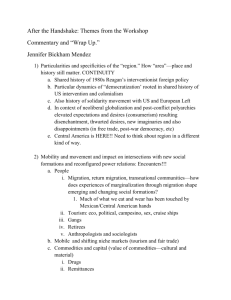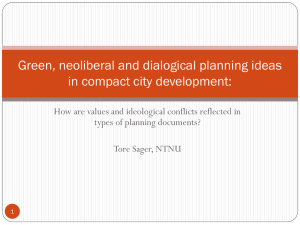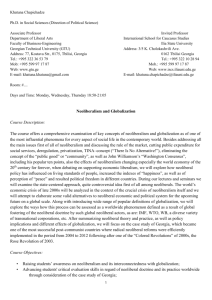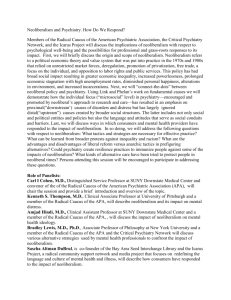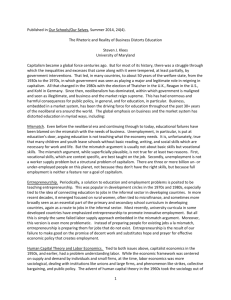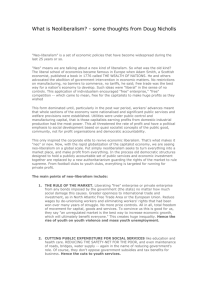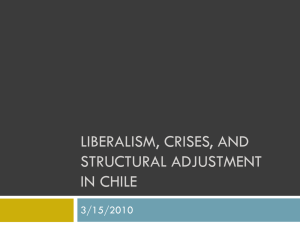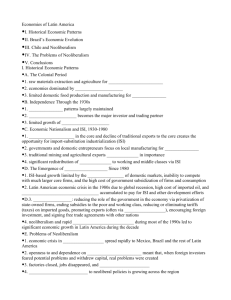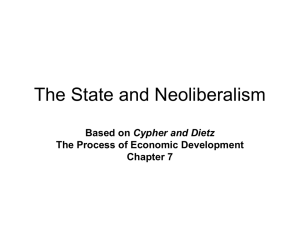William Lawler ANTH 410 3/9/14 Neoliberalism: Pros vs. Cons
advertisement
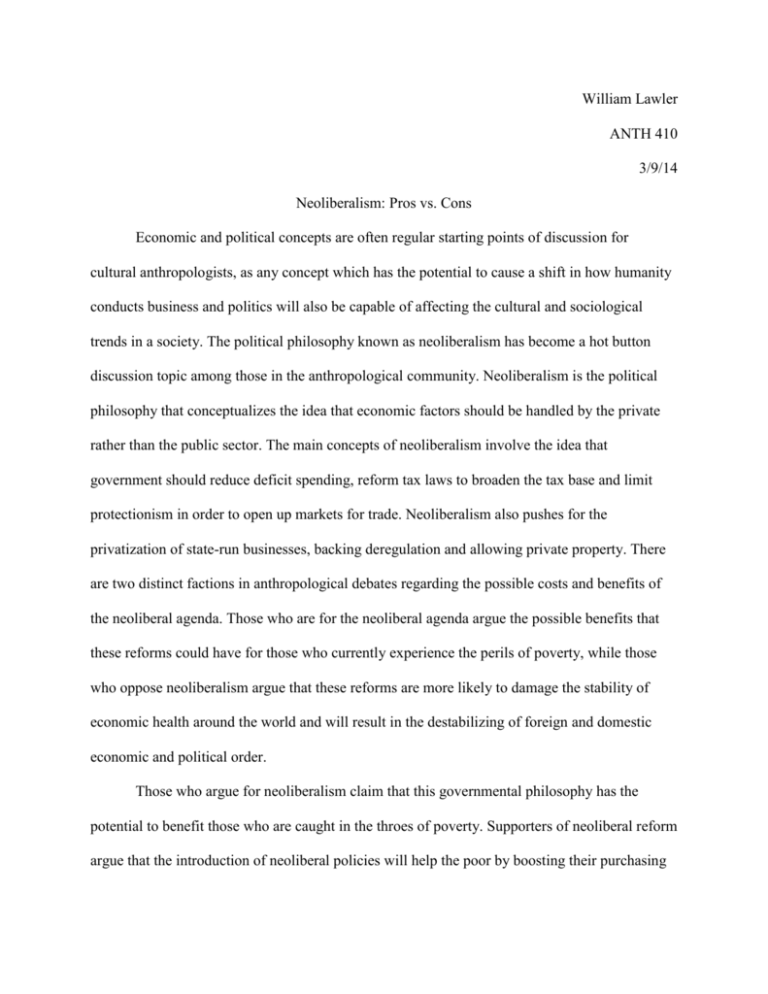
William Lawler ANTH 410 3/9/14 Neoliberalism: Pros vs. Cons Economic and political concepts are often regular starting points of discussion for cultural anthropologists, as any concept which has the potential to cause a shift in how humanity conducts business and politics will also be capable of affecting the cultural and sociological trends in a society. The political philosophy known as neoliberalism has become a hot button discussion topic among those in the anthropological community. Neoliberalism is the political philosophy that conceptualizes the idea that economic factors should be handled by the private rather than the public sector. The main concepts of neoliberalism involve the idea that government should reduce deficit spending, reform tax laws to broaden the tax base and limit protectionism in order to open up markets for trade. Neoliberalism also pushes for the privatization of state-run businesses, backing deregulation and allowing private property. There are two distinct factions in anthropological debates regarding the possible costs and benefits of the neoliberal agenda. Those who are for the neoliberal agenda argue the possible benefits that these reforms could have for those who currently experience the perils of poverty, while those who oppose neoliberalism argue that these reforms are more likely to damage the stability of economic health around the world and will result in the destabilizing of foreign and domestic economic and political order. Those who argue for neoliberalism claim that this governmental philosophy has the potential to benefit those who are caught in the throes of poverty. Supporters of neoliberal reform argue that the introduction of neoliberal policies will help the poor by boosting their purchasing power. What this refers to is the idea that the markets cater to those who have purchasing power and that by providing purchasing power to those in poverty, the market is manipulated to benefit those in need. By using this model pro-neoliberals argue that markets can be used to provide those in poverty with essentials services, such as food aid. Pro-neoliberals also argue that neoliberal agendas will help stabilize society. The argument here is that neoliberalistic policies remove control of economic activities from a centralized government power which will separate economic power from political power. In this manner it is possible for economic and political powers to operate as counterbalances to one another as they now operate independently. The neoliberal view of competitive capitalism is believed to be more beneficial for the poor or members of minority groups, as the introduction of impersonal markets should protect those groups from discrimination. Those who argue against neoliberalism claim that it will destabilize the economic and political institutions that are currently in practice, resulting in negative trends in the market which will hurt more people than it helps. The concept of replacing centrally monitored markets with private companies could result in the destabilization of the market, or at least a marked decrease in the efficiency experienced with a centrally organized economy. There is also the concern that with the privatization of world markets, corporations will experience an increase in their economic and political power, resulting in a shift of power to the upper classes. These private companies could also prove to be unaccountable to their stake holders as they would have the right to business secrecy due to their status as a private company. Deregulation of the labor markets could also lead to an increase in work related health problems caused by the casualization of labor and an increase in informal employment. Those who oppose neoliberal views claim that even if these concepts increased productivity, they could not be maintained ling term as the increase in competition amongst private companies would invariably lead to an increase in the amount of available resources. My personal views on neoliberalism fall more on the side of the pro-neoliberals agenda. I feel that the market is less likely to face corruption from within if it is not monitored by one central government. By allowing the involvement of private companies in the market, competition between them will help deter corruption and allow for an increase in free trade. While the idea of unregulated work environments and increased on the job accidents is not particularly appealing, it is still more beneficial economically to have more individuals working, even if they are underemployed, rather than to keep them unemployed because available jobs do not meet the minimum government health regulations. I also feel that the neoliberalist policies regarding the poor, particularly those that can be applied to essentials such as food aid, are useful and essential tools to be used in the process of increasing the overall health and well-being of the population. I believe in the sentiment that increasing economic freedoms will eventually lead to an overall increase in political freedom, which can often lead to an increased likelihood that a society will develop a democratic government system

